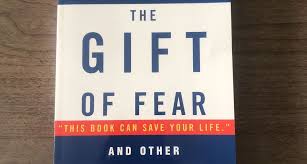
Gavin de Becker’s “The Gift of Fear” is a timeless book that provides insight into our natural ability to detect danger. Gavin is a world renowned authority on predicting violent behavior. He owns a firm that advises and protects many of the most prominent people in the world. He reminds us that like every creature, we can know when we are in the presence of danger. We all see the signals because there is a universal code of violence. This book helps us to break that code. We recommend that every woman read this book. The information is life changing and invaluable.
10 Key Takeaways:
- We have a natural gift or intuition that we often ignore and talk ourselves out of hearing. We are the only creatures that sense danger and walk in anyway. The feeling is the warning sign. We have a gift of intuition that tells us something is not right. Many times our brain gets in the way and tells us to ignore our internal cues.
- “No.” is a complete sentence. A person who ignores “no” is trying to control you. “When a man in our culture says No, it’s the end of the discussion, and when a woman in our culture says No, it’s the beginning of a negotiation
- The best response is no response. If you tell someone “no” 10 times you are talking to them 9 more times than you wanted to. Responding after 20 messages teaches that you will respond after 20 messages.
- Strangers will try to lure you in with friendliness and charm, but you can learn to know what to look for to know when a person sounds too good to be true. Charm is a verb used to manipulate and not a character trait.
- Beware of what is called “forced teaming”. We can recognize it when a stranger uses the word “we”.
- Notice when someone who is giving you an uneasy sense also uses too many details. When a person is lying they will give too many details.
- Strangers will engage in loan sharking (offering things) when choosing a victim. They Give unsolicited help to the chosen victim and anticipate they’ll feel obliged to extend some reciprocal openness in return.
- Typecasting is an insult and it is used to get a chosen victim who would otherwise ignore one to engage in conversation to counteract the insult. For example: “Oh, I bet you’re too stuck-up to talk to a guy like me.” The tendency is for the chosen victim to want to prove the insult untrue.
- When out alone it is better to turn around completely and take everything in. It gives you information and communicates that you are not tentative.
- Be careful with an unsolicited promise. A promise to do (or not do) something when no such promise is asked for; this usually means that such a promise will be broken. For example: an unsolicited, “I promise I’ll leave you alone after this,” usually means the chosen victim will not be left alone. Similarly, an unsolicited “I promise I won’t hurt you” usually means the person intends to hurt their chosen victim.
